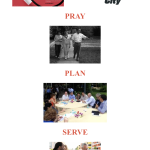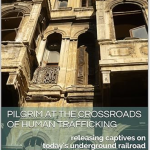Disciple-making Movements (DMM), otherwise known as church-planting movements (CPM), are seemingly sweeping through the world by storm. Some researchers are now pointing to more than 1000 movements toward Christ. In your opinion, what does the *Bible* have to say about these movements? Click the title to share your opinion and read one major piece.
4) What’s Your Take on the Theology of “DMM?”













See, for example, Warrick Farah’s piece, Motus Dei: Disciple-Making Movements and the Mission of God, http://ojs.globalmissiology.org/index.php/english/article/view/2309 , just released in the January 2020 issue of Global Missiology.
Here’s the abstract on Warrick’s article, “Motus Dei:”
“God’s mission is diverse, and so are the ways missiologists discuss it. This article outlines a constructive missiology of the current “disciple-making movement” phenomenon in a way that makes creative connections between different conversations in the field of mission studies. In so doing, a new concept called motus Dei (Latin for movement of God) is situated into our understanding of the missio Dei.”
Thank you Doug, for linking to my essay above. I hope readers will have a lot to think about after reading it. I appreciate you asking this very important question!
In my experience, there are incredibly diverse ways to doing theology and thinking theologically, and any theological assessment of DMM will have to bear that in mind. DMM is also a massive subject, so the framework may have to be more specific than just a theology of DMM in general in order for the conversation to be more fruitful. There is also diversity in DMM, so assessments will also need to focus on a specific presentation of the DMM strategy or a particular movement. And that is just the point, that DMM is both an emerging approach to ministry but also a reality in the world, so inquiry could focus on either the strategy or on the phenomenon itself.
My essay outlines a brief missiology of DMM, which I think is a more appropriate starting place. But that being said, my initial tentative answer to your question is in the article, “I would argue that, in general, the DMM methodology is not explicitly biblical per se, but neither is it explicitly unbiblical. Individual principles of DMM are clearly found in the Bible (Garrison 2014b), but, like most ministry approaches, there are no clear examples of the synthesized DMM strategy prescribed in Scripture. However, there are ways of ministry that seem to be more prone to multiplication, especially when compared with approaches that center around an attractional, institutional church (Esler 2013). Moreover, while DMM is not anti-institutional, it is anti-institutionalization. Institutions are important to all movements, but their misuse can inhibit multiplication. Both those who are pro-DMM and those who are cautious of it would do well to recognize this multiplying aspect of DMMs. If there is wisdom in the approach, especially as it has been induced from the phenomena itself, then it deserves serious attention. But at the same time, DMM doesn’t need to be presented as the only biblical approach for engaging the world in mission.”
I’m currently working on another essay at the moment titled “Discipleship Movements Today: A Primer from Multiple Perspectives,” where I use the lenses of History, Ecclesiology, Sociology, and Praxis to think missiologically about DMM – kind of a part II to this article under discussion (http://ojs.globalmissiology.org/index.php/english/article/view/2309/5306). This part II will be the opening chapter for the book coming out of the Movements Research Symposium this October in Beirut: http://muslimministry.blogspot.com/p/movements.html
I would love to get some feedback from you Doug, or anyone else interested in this conversation! :-)
totally agree it reflects the pattern Jesus set.
I’ve had to travel from a very materialist mindset – all things can be explained and using apologetic to win a hearing to
meeting people and and building friendships bathed in prayer and intercession and reading Scripture and watching the HS work.
Bless you Ted, for making the journey!
The great commission charges us to make disciples. We as a church have for too long focused on making converts who are not challenged nor trained to make disciples. Many who encounter one who wants to know Christ will likely first refer the seeker to their pastor, a stranger to the seeker.
We grow slowly by addition but much, much more rapidly by multiplication…a simple but seemingly ignored fact
nice one ty!